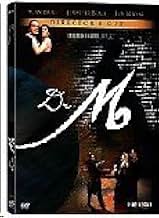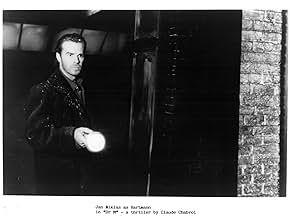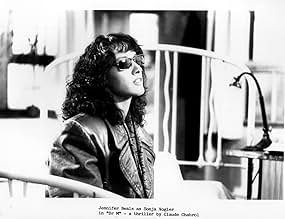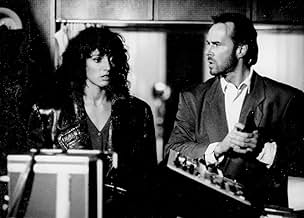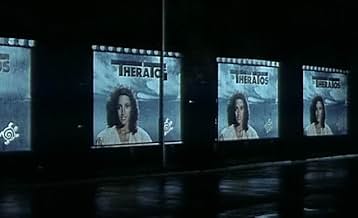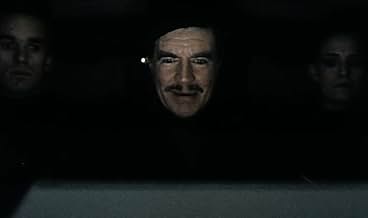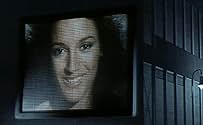Aggiungi una trama nella tua linguaInvestigating a series of suicides, police detective reveals a sinister plot.Investigating a series of suicides, police detective reveals a sinister plot.Investigating a series of suicides, police detective reveals a sinister plot.
- Regia
- Sceneggiatura
- Star
Recensioni in evidenza
To begin with, I vividly recall reading the mixed newspaper review of this one when it was surprisingly released locally; needless to say, I missed it at the time and, until earlier this year, never again did I have the opportunity to check it out. In fact, it turned up – alas, dubbed – on late-night Italian TV and, though I did record it, I recently opted to acquire the English-language version
which is just as well, since two deleted scenes were included in the package! Anyway, knowing the flak the film has received (which was practically universal), I really did not know what to expect from it. However, I must say that I liked it quite a bit, while acknowledging it cannot hold a candle to any of Fritz Lang's movies revolving around the influential figure of criminal mastermind Dr. Mabuse (here, the name has even been changed to Marsfeldt!). Incidentally, the actor most identified with the role (in a revival series of 1960s low-budget efforts) i.e. Wolfgang Preiss appears here as the Chief Of Police!
Perhaps the film does at times feel like one of the many German TV cop shows which have flooded the market from the 1970s and still continue to this day, but there is no denying the grip of the narrative (which tried, but unfortunately failed, to be prophetic when the Berlin Wall got torn down only months before the picture debuted!). Equally striking is the imagery pertaining to mass suicide (the most disturbing being a child waiter in full view of the patrons at a swank and busy restaurant), media manipulation and wasted disco-crazy youth (appropriately bleak though, I concede, not all that original).
The intense performances are also a plus: particularly Alan Bates as the outwardly charming but obviously sinister Dr. M and Jan Niklas as the disenchanted yet dogged cop on his trail of terror, though heroine Jennifer Beals proves no mere purveyor of eye candy either. Indeed, Bates' occasional resort to hamminess (especially when he passes himself off as a psychedelic guru at a desert holiday resort and spouting his nihilistic credo to an incredulous, disgusted Beals and Niklas during the climax – set in the Doctor's obligatory 'control room' – all the while connected to a life-support system!) are perfectly in keeping with the fanciful goings-on. The eclectic cast also includes the likes of Euro-Cult regular William Berger, future Italian TV presenter Daniela Poggi and former "Brat Pack"-er Andrew McCarthy in small roles.
In the end, while it may fall short of Chabrol's best work, the film nonetheless makes for a thought-provoking, stylized and yet entertaining parable on our less-than-reassuring times (incidentally, its suggestion/fear of the millennium as the 'end of days' is pretty amusing at this juncture).
Perhaps the film does at times feel like one of the many German TV cop shows which have flooded the market from the 1970s and still continue to this day, but there is no denying the grip of the narrative (which tried, but unfortunately failed, to be prophetic when the Berlin Wall got torn down only months before the picture debuted!). Equally striking is the imagery pertaining to mass suicide (the most disturbing being a child waiter in full view of the patrons at a swank and busy restaurant), media manipulation and wasted disco-crazy youth (appropriately bleak though, I concede, not all that original).
The intense performances are also a plus: particularly Alan Bates as the outwardly charming but obviously sinister Dr. M and Jan Niklas as the disenchanted yet dogged cop on his trail of terror, though heroine Jennifer Beals proves no mere purveyor of eye candy either. Indeed, Bates' occasional resort to hamminess (especially when he passes himself off as a psychedelic guru at a desert holiday resort and spouting his nihilistic credo to an incredulous, disgusted Beals and Niklas during the climax – set in the Doctor's obligatory 'control room' – all the while connected to a life-support system!) are perfectly in keeping with the fanciful goings-on. The eclectic cast also includes the likes of Euro-Cult regular William Berger, future Italian TV presenter Daniela Poggi and former "Brat Pack"-er Andrew McCarthy in small roles.
In the end, while it may fall short of Chabrol's best work, the film nonetheless makes for a thought-provoking, stylized and yet entertaining parable on our less-than-reassuring times (incidentally, its suggestion/fear of the millennium as the 'end of days' is pretty amusing at this juncture).
I wanted to like this and I did for what it could have been and not the sorry mess it turned out to be ..... I even enjoyed the auto smash it turned into because all the ingredients were there but didnt get used ...
Brave concept ..crap realization .... but I do love B Grade sci Fi so I got off on it for the crap it was ... If you like the Outer Limits this one is for you sorta like "the boy and his dog" that thought too much and tried too hard ... woof
Brave concept ..crap realization .... but I do love B Grade sci Fi so I got off on it for the crap it was ... If you like the Outer Limits this one is for you sorta like "the boy and his dog" that thought too much and tried too hard ... woof
My review was written in January 1991 after watching the film on Prism video cassette.
Claude Chabrol goes sci-fi with depressing results in "Dr. M", an already dated 1989 European production that opened in Paris last November but reaches the U.. in video stores and retitled "Club Extinction".
Film is inspired by Fritz Lang's classic "Dr. Mabuse" features, but Chabrol clearly is not comfortable with this form. The dialog is stilted, and many scenes are designed for somnambulist acting more suited to the expressionism of Robert Wiene's "Dr. Caligari" than Lang's work.
Alan Bates plays two roles: the title Dr. Marsfeldt, head of a German media conglomerate, and (uncredited) a white bearded guru who lords it over a Marsfeldt-owned resort Club Theratos that's closer to Jim Jones' Jonestown than Club Med. As the guru, he talks in a funny voice and hams it up embarrassingly.
The Berlin Wall is used throughout "Dr. M" as a metaphor for modern malaise, its presence contaminating the stry's Berliners in a way now hopelessly dated since the wall was torn down. Using tv spokesmodel Jennifer Beals as his main instrument, Dr. M is causing Berliners to commit suicide by sending out subliminal messges over the airwaves beneath broadcasts exhorting folks to escape for a vaction at Theratos.
Jan Niklas plays the dogged police investigor trying to make sense of the rash of suicides, all of which point at Beals' involvemetn. He predictably falls in love with her and ultimately accompanies her to Theratos for an anticlimactic ending.
Except for repetitive use of an annoying noise-song by Mekong Delta to suggest the anomie of folks at a local nightclub, "Dr. M" is easy to watch. Best performance is by Hanns Zischler, erstwhile co-star of Wim Wenders' "Kings of the Road", who has honed his English dialog delivery to perfection.
Guest star Andrew McCarthy, who toplined Chabrol's "Quiet Days in Clichy", pops up briefly as an assassin.
Claude Chabrol goes sci-fi with depressing results in "Dr. M", an already dated 1989 European production that opened in Paris last November but reaches the U.. in video stores and retitled "Club Extinction".
Film is inspired by Fritz Lang's classic "Dr. Mabuse" features, but Chabrol clearly is not comfortable with this form. The dialog is stilted, and many scenes are designed for somnambulist acting more suited to the expressionism of Robert Wiene's "Dr. Caligari" than Lang's work.
Alan Bates plays two roles: the title Dr. Marsfeldt, head of a German media conglomerate, and (uncredited) a white bearded guru who lords it over a Marsfeldt-owned resort Club Theratos that's closer to Jim Jones' Jonestown than Club Med. As the guru, he talks in a funny voice and hams it up embarrassingly.
The Berlin Wall is used throughout "Dr. M" as a metaphor for modern malaise, its presence contaminating the stry's Berliners in a way now hopelessly dated since the wall was torn down. Using tv spokesmodel Jennifer Beals as his main instrument, Dr. M is causing Berliners to commit suicide by sending out subliminal messges over the airwaves beneath broadcasts exhorting folks to escape for a vaction at Theratos.
Jan Niklas plays the dogged police investigor trying to make sense of the rash of suicides, all of which point at Beals' involvemetn. He predictably falls in love with her and ultimately accompanies her to Theratos for an anticlimactic ending.
Except for repetitive use of an annoying noise-song by Mekong Delta to suggest the anomie of folks at a local nightclub, "Dr. M" is easy to watch. Best performance is by Hanns Zischler, erstwhile co-star of Wim Wenders' "Kings of the Road", who has honed his English dialog delivery to perfection.
Guest star Andrew McCarthy, who toplined Chabrol's "Quiet Days in Clichy", pops up briefly as an assassin.
10bensan9
The only negative I can come up with on this is that it is kind of slow. I felt the cheapness just adds to the charm. Should be watched on VHS for best effect.
The actors are good all across the board. Jennifer Beals is a beauty. The mood is depressive and dark with nice music. The location and feel of the architecture and settings are so very cool. Kind of a state controlled European feel going on. The story is interesting and thoughtful. I thought the scenes all fit together in a great way with the sounds and such making this one really great. The repetition of seeing screens of Beals face talking about time all through the film makes it a very trippy, cool film.
I will be watching this one over and over. Awesome film!
The actors are good all across the board. Jennifer Beals is a beauty. The mood is depressive and dark with nice music. The location and feel of the architecture and settings are so very cool. Kind of a state controlled European feel going on. The story is interesting and thoughtful. I thought the scenes all fit together in a great way with the sounds and such making this one really great. The repetition of seeing screens of Beals face talking about time all through the film makes it a very trippy, cool film.
I will be watching this one over and over. Awesome film!
This is not a good film. Check out the rave reviews. They are left from people who think they have more intellect than you. They make comments like "most people won't understand this movie."
That's poor writing not superior intelligence.
The film is a very low budget fare. The story line is not compelling. And who cares if it's a quasi remake of Dr. Mabuse? So it's a bad version of it.
It reminds me more of Alphaville than Dr. Mabuse. Just not as good.
That's poor writing not superior intelligence.
The film is a very low budget fare. The story line is not compelling. And who cares if it's a quasi remake of Dr. Mabuse? So it's a bad version of it.
It reminds me more of Alphaville than Dr. Mabuse. Just not as good.
Lo sapevi?
- QuizAlthough director Claude Chabrol was famous for his extreme admiration for Alfred Hitchcock, who is frequently referenced in Chabrol films, he eventually came to believe that Fritz Lang was an even more important film-maker, once telling an interviewer that "without Lang, there would be no Hitchcock". This film was designed specifically as an elaborate tribute to Lang and was released in 1990, the centenary year of Lang's birth.
- ConnessioniFollowed by Doctor Mabuse (2013)
I più visti
Accedi per valutare e creare un elenco di titoli salvati per ottenere consigli personalizzati
- How long is Dr. M?Powered by Alexa
Dettagli
- Tempo di esecuzione1 ora 56 minuti
- Colore
- Mix di suoni
- Proporzioni
- 1.66 : 1
Contribuisci a questa pagina
Suggerisci una modifica o aggiungi i contenuti mancanti


